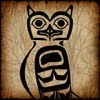Here I have an excellent article, written by a late environmental philosopher who died in her home in the Australian wilderness of a snakebite. My friend Kangi showed me this; it is yet another thing I am indebted to him for. This article certainly brings an interesting new angle to an old perspective: our need to consciously situate ourselves in the ecological story that we all naturally belong to.
The name of this article is "Tasteless: Towards a Food-Based Approach to Death" and it is by Val Plumwood. It can be found here:
Tasteless: Towards a Food-Based Approach to Death
I hope to snare your interest by posting the first three paragraphs of this excellent and important work here:
“Tasteless: Towards a Food-Based Approach to Death” by Val Plumwood
Food/Death
Two encounters with death led to my becoming radically dissatisfied with the usual western selection of death narratives -- both Christian-monotheist AND modernist-atheist. I think both major traditions inherit the human exceptionalism and hyper-separation that propels the environmental crisis. However, there are encouraging signs of a developing animist consciousness and mortuary practice that challenges exceptionalism and grasps human of death in terms of reciprocity in the earth community.
Some years ago, as an already established environmental philosopher, I had a close encounter with food/death, death as food for a large predator. I was seized by a Saltwater Crocodile, largest of the living saurians, heirs to the gastronomic tastes of the ancient dinosaurs. By a fortunate conjunction of circumstances I survived – slightly tenderized, but basically set aside for another occasion. Since then it has seemed to me that our worldview denies the most basic feature of animal existence on planet earth – that we are food and that through death we nourish others. The food/death perspective, so familiar to our ancestors, is something the human exceptionalism of western modernity has structured out of serious comment. Attention to human foodiness is tasteless. Of course we are all routinely nibbled both during and after life by all sorts of very small creatures, but in the microscopic context our essential foodiness is much easier to ignore than in one where we are munched by a noticeably large predator.
Modernist liberal individualism teaches us that we own our lives and bodies, politically as an enterprise we are running, experientially as a drama we are variously narrating, writing, and/or reading. As hyper-individuals, we owe nothing to nobody, not to our mothers, let alone to any nebulous earth community. Exceptionalised as both species and individuals, we humans cannot be positioned in the food chain in the same way as other animals. Predation on humans is monstrous, exceptionalised and subject to extreme retaliation. Horror movies, stories and jokes reflect our deep-seated dread of becoming food for other forms of life : horror is the wormy corpse, vampires sucking blood and sci-fi monsters trying to eat humans ("Alien 1 and 2"). Horror and outrage greet stories of other species eating live or dead humans, various levels of hysteria our nibbling by leeches, sandflies, mosquitoes and worms. Dominant concepts of human identity position humans outside and above the food chain, not as part of the feast in a chain of reciprocity. Animals can be our food, but we can never be their food. Human Exceptionalism positions us as the eaters of others who are never themselves eaten.
Thursday, March 27, 2008
Tasteless: Towards a Food-Based Approach to Death
Subscribe to:
Post Comments (Atom)




No comments:
Post a Comment